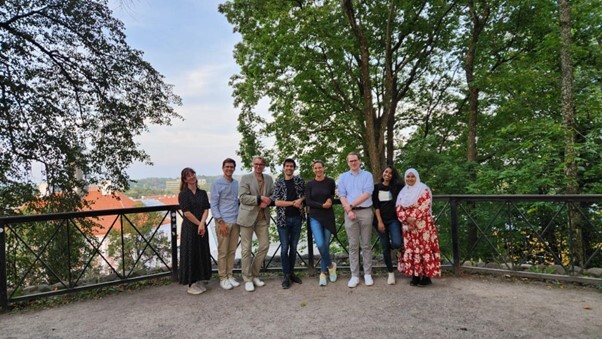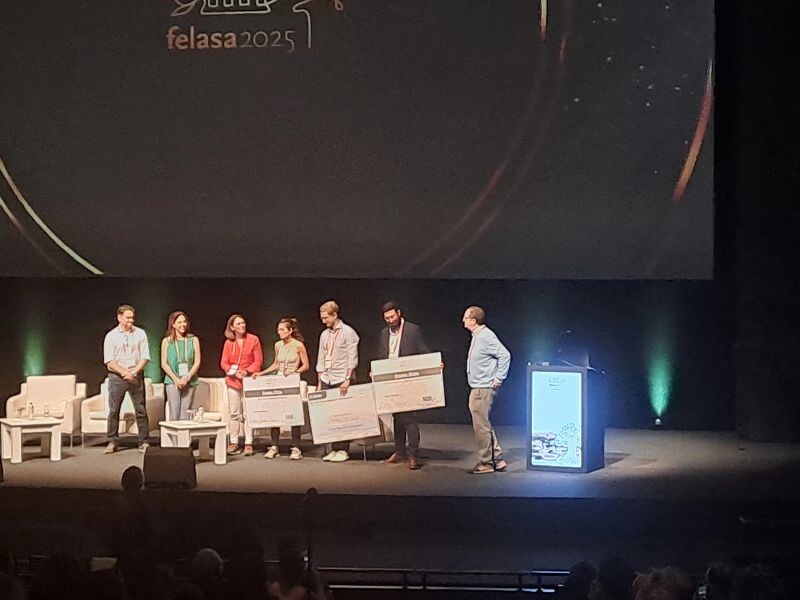What a finish! Over two packed days in Helsinki, the TEATIME community came together to celebrate a four-year journey and set the tone for what comes next in home-cage monitoring (HCM). Seventy-four people attended in-person and were joined by 113 online. The meeting felt like a reunion and a launchpad at once: young researchers, senior researchers, industry partners and funders mingled without boundaries. The atmosphere was warm, generous, and strikingly open – exactly the spirit that has made TEATIME such a productive network.
Session 1 – Legacy of TEATIME: closing the circle
The opening session traced TEATIME from a small pandemic-era discussion group to a mature network. We heard how the community didn’t just critique the literature, it built enduring resources: a living catalogue of ~50 HCM technologies that people refer to find a system that best suits their needs; the popular and expanding Behaviour Forum that lowers the barrier for advice, troubleshooting, and collaboration; and the push toward shared language with the Mouse Behaviour Ontology to harmonize what we measure and how we describe it.
Session 2 – COST: building bridges, boosting careers
This session captured TEATIME’s human impact. Young Researchers spoke about finding a voice and support through training schools, short-term scientific missions, and the confidence to lead sub-working groups. We also heard how classic labs are weaving HCM into everyday neuropharmacology, not as an expensive add-on but as a path to better welfare and better data. COST has not supported just travel; it has brought together a generation of young researchers who now see collaboration and open exchange as default settings.

Session 3 – Short talks from selected abstracts
Talks spanned computational affect in mice, refinement in CNS injury and repeated anaesthesia models, AI-derived digital biomarkers for early disease detection, and translational heart-rate dynamics that connect mouse telemetry to human risk signatures. We also saw the practical side of innovation: low-cost pre-weaning phenotyping, an RFID-based mouse position system for preference tests, and an open-source platform that synchronises feeding behaviour with brain signals.
Session 4 – From bedding to bedside
The morning bridged animal and human work. We saw transdiagnostic frameworks for social dysfunction backed by coherent biomarkers across species; mobile EMA/EMI approaches that capture human craving in real life and deliver help at the right moment; and a tour of “physiological sensing anywhere” that underscored how low-cost hardware and open software can enable continuous monitoring.
Session 5 – Bridging drug discovery and animal welfare
Talks emphasised a changing landscape: reproducible, high-quality in vivo data and welfare refinement are not trade-offs but twin drivers. Discussion centred on challenges we all recognise: standardisation, metadata, computational load and concrete responses, including FAIR portals for preclinical data sharing, defined metadata practice, and conversations about ethics and security.
Session 6 – From idea to ideal: success stories
Evolving efforts to automate circadian and sleep assessment showed how careful design and shared tooling can scale beyond the originating lab. Live Mouse Tracker illustrated sophisticated group-housing phenotyping that still respects social complexity. FED3 reminded us how an affordable, opensource device can transform what is feasible in home-cages.
Session 7 – Future perspectives beyond TEATIME
Talks detailed machine-learning pipelines robust enough for months-long continuous monitoring; HCM as a proactive strategy for uncovering CNS safety risks that legacy tests miss; and strategic foresight for a volatile research world. The closing contribution on a FAIR repository for HCM data showed the TEATIME community at its best: cross-institutional, deliberately standards-driven, and determined to make sharing the path of least resistance.
Poster session highlights
The poster session after the main meeting on Day 1 was a good occasion to mingle and talk about research. All posters (20) generated high interest and engaging discussions. Delegates were also given the chance to vote for their favourite posters, and the “winners” were Andrea Leuthardt (University of Zurich, Switzerland), Alice Melloni (Italian Institute of Technology, Genova, Italy), Daniela Duarte-Domingues (Center for Research in Neuroscience in Lyon, France) and Oskar Ikäheimo/ Gabriel Peinado Allina (Aalto University, Finland).
There was also the chance to play the new TEATIME-BEST boardgame which was a fun and engaging way to promote best practices in home-cage monitoring, encompassing the entire journey of a potential user, aimed to encourage engagement for every level of user, from plug and play users to DIY enthusiasts. The ideas and practices promoted in this game were an amalgamation of all the discussion from the ‘problem solving café’ held in the first year of the TEATIME WG3 and then from a dedicated thread on the TEATIME open Q&A forum (www.thebehaviourforum.org). Not to mention the myriad of conversations that TEATIME meetings have promoted over its lifetime.
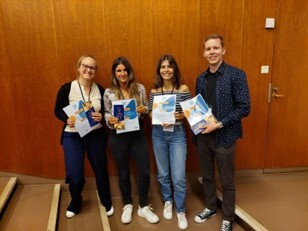
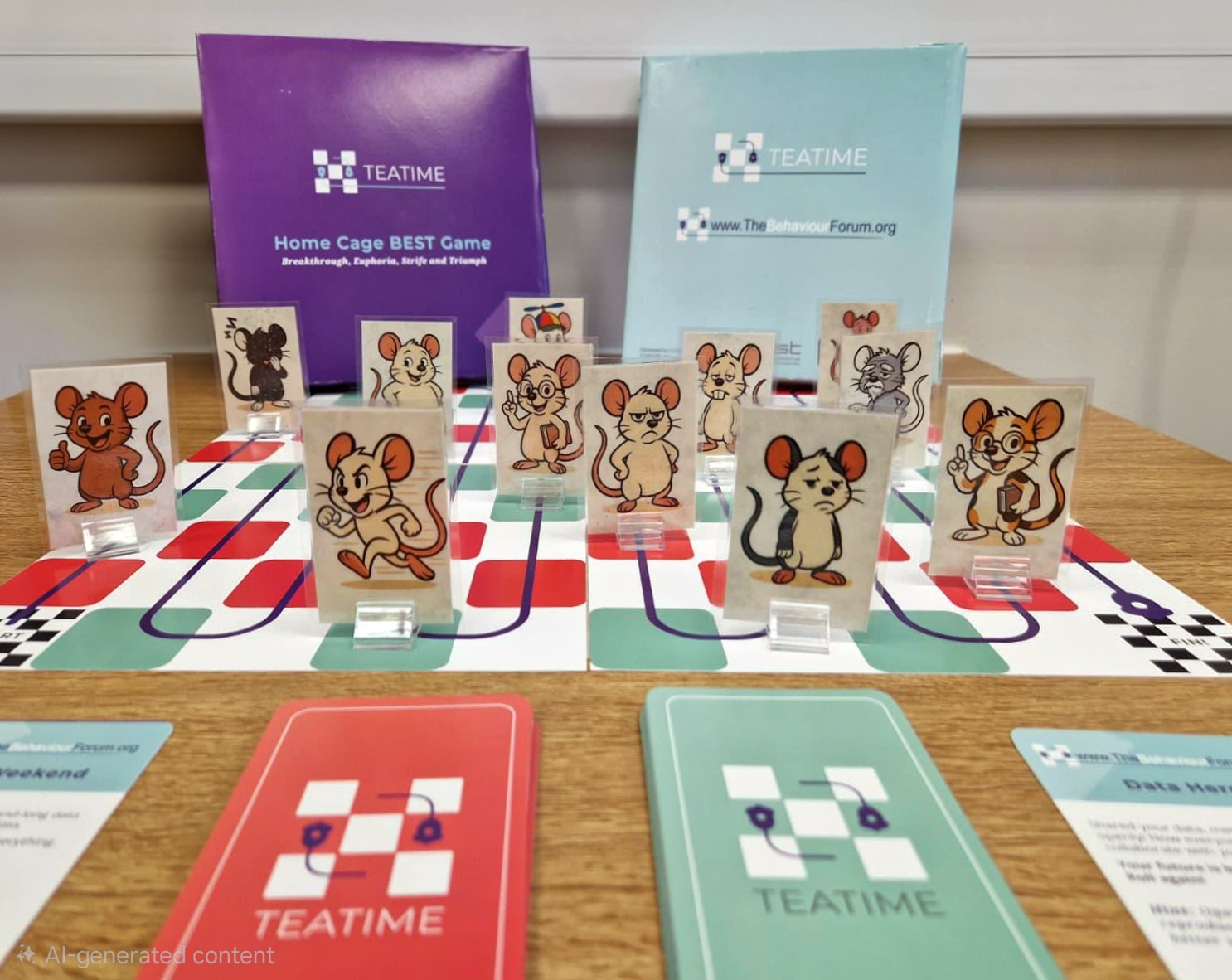
Overall impressions
If one word captured the meeting, it was generosity. Senior researchers took time to mentor, younger colleagues brought ideas and industry partners engaged as collaborators. Delegates embraced the 3Rs as a route to better science. Coffee breaks ran long (in the best way), and the general interactions, including the conference dinner, demonstrated that this is a community that enjoys working together.
While the TEATIME Action formally ends in October 2025, the infrastructure and relationships are very much alive: the Behaviour Forum as a shared platform; the HCM technology catalogue as a gateway for new users; a maturing plan for a FAIR HCM repository that could unlock sharing and meta-analysis using AI and a number of joint publications underway. All this combined with new; lasting relationships built between members that will carry on providing support and opportunities to work together well beyond the life of the Action.
Our sincere thanks to the University of Helsinki and the Helsinki Institute of Life Science for providing a great venue and being excellent hosts and to the COST Association for supporting the network. And finally, thanks to everyone who attended in-person and online and to all the presenters of talks and posters.
Let’s keep the TEATIME conversation going and together continue to shape the future of home-cage monitoring.
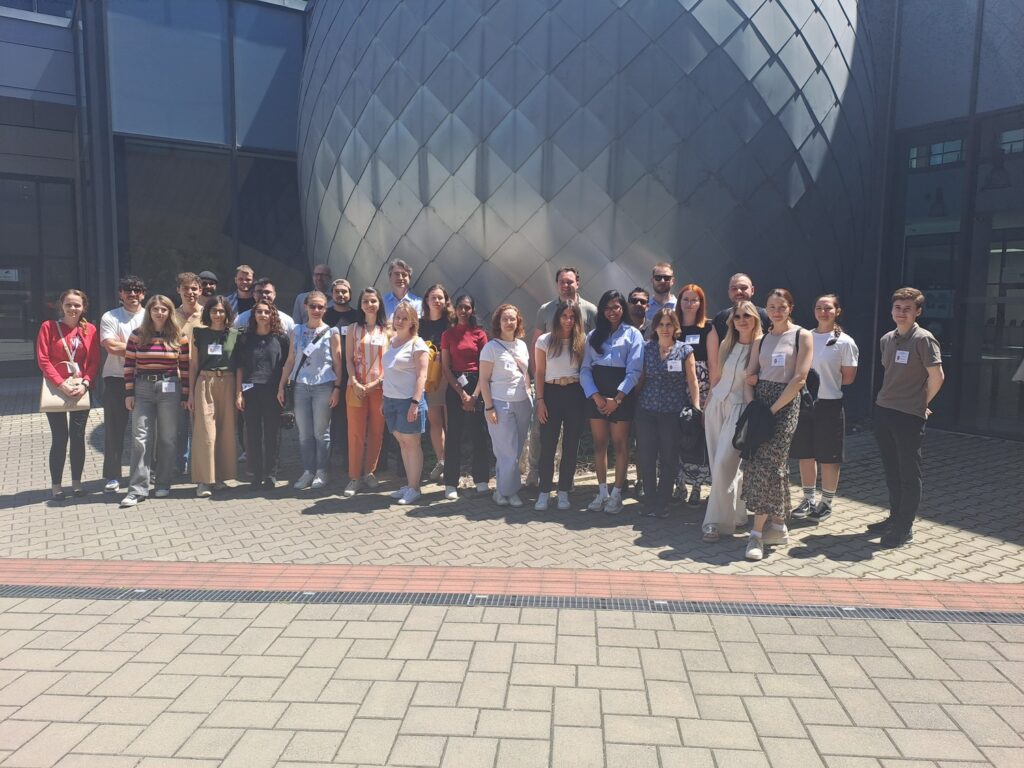
What happens when you put 25 curious, motivated young researchers in a room with leading experts in rodent behavior, home cage technologies, and some seriously cool tracking software? You get the Second TEATIME Beginners Training School — four jam-packed days of hands-on learning, eye-opening lectures, and more scientific “aha!” moments than you can count.
Hosted at the Faculty of Medicine at Comenius University in beautiful Bratislava, this COST-funded event (part of the TEATIME Action CA20135) brought together Master’s, PhD, and postdoc-level researchers for a deep dive into home cage monitoring. It wasn’t just about learning — it was about connecting, experimenting, and seeing behavioral science from a new perspective.
The main aim? To explore the use of home cage technologies to assess rodent behavior in more natural and welfare-friendly ways — all while gaining exposure to cutting-edge tools, building collaborations, and getting feedback from world-class experts.
If you thought stats were dull, Nuno Franco made you think again. With his no-nonsense approach, he walked us through the essentials of good scientific practice — from sample size and blinding to randomization and avoiding bias. His advice? “Design with care, analyze with purpose, and never underestimate the power of proper planning.”
We got hands-on with both commercial tools (ANY-maze and EthoVision) and open-source options like DeepLabCut. Whether you were a beginner or already dabbling in code, there was something for everyone. Daniela Domingues’s DeepLabCut session was a fave — imagine training AI to recognize and track mouse poses. It’s as cool as it sounds.
From classical mazes to fully automated home cage systems, we compared the pros and cons of each approach. The home cage systems really stood out — offering round-the-clock insights without the stress of removing animals from their environment. Plus, we saw real examples of how these tools are being adapted for complex conditions like depression, anxiety, and even social behaviors.
Sessions from Silvia Mandillo and Otto Kalliokoski turned into mini masterclasses on how to think critically, plan effectively, and even troubleshoot like a pro. Otto’s “Game of Science” session had us all questioning our assumptions in the best possible way.
In the words of the group, the week and experience was:
Inspiring, Supportive,
Innovative, Practical,
Mind-blowing, Motivating,
Fun
Every day was a mix of deep learning and real conversations. The workshops were hands-on and full of useful takeaways. The student presentations gave us all a chance to showcase our work and get feedback from peers and pros alike. And let’s not forget the socials — Bratislava did not disappoint when it came to food, drinks, karaoke and late-night scientific debates!
By the end of the week, we weren’t just attendees — we were part of a growing community. The TEATIME network really lives up to its name, creating a space where young researchers can learn, connect, and grow alongside some of the best researchers in the field.
Massive thanks to COST and the organizing team, especially Veronika Borbélyová, for making this all possible and to trainees and trainers: thanks for the support, the brainpower, and the shared goal of making behavioral research better for both science and the animals.
Until next time!
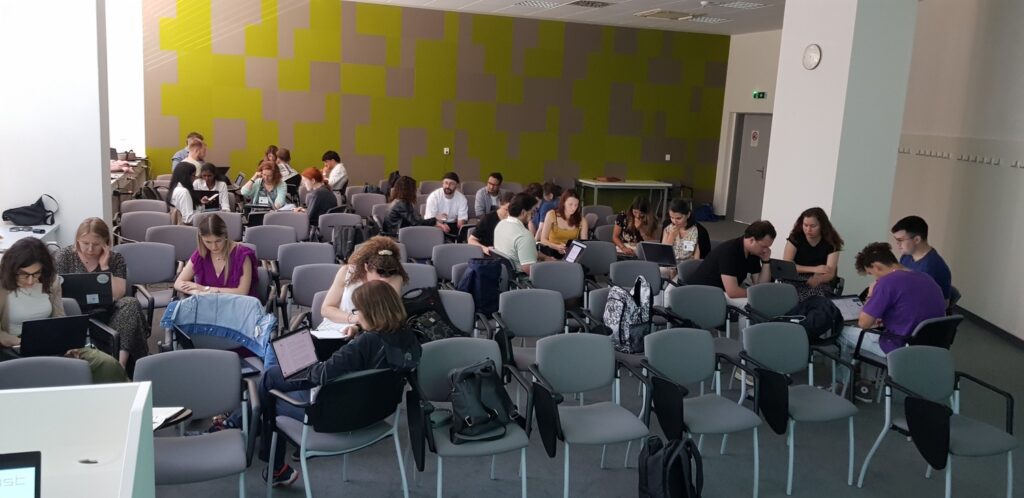
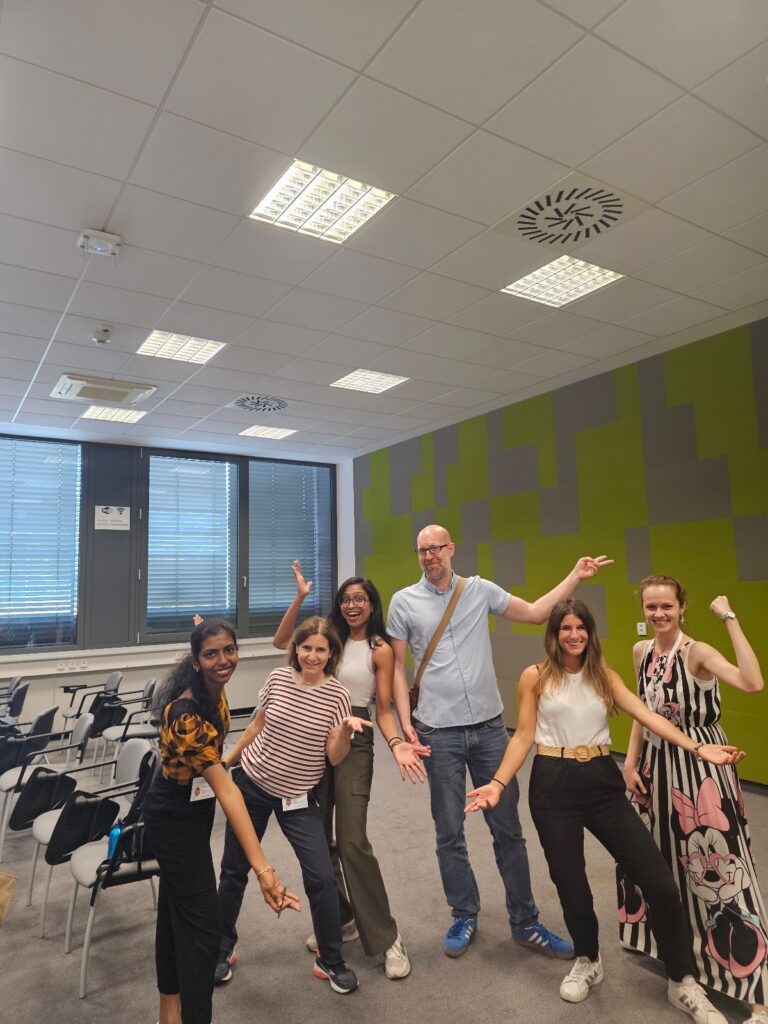

Last month, the vibrant city of Athens hosted the 15th FELASA Congress, and TEATIME was present with an inspiring and diverse team. Over four days, our members contributed to a packed programme of lectures, workshops, and poster presentations, all dedicated to advancing laboratory animal science and promoting better animal research practices.
TEATIME session, Promises of Automated Home Cage Monitoring – Better Future for Animals and Research, led by our Action Chair Vootele Voikar, was one of the first ones starting the conference. The first talk, delivered by co-chair Sara Wells, set the tone for meaningful discussions on how automated monitoring technologies are reshaping animal welfare and experimental design. Throughout the event, Lars Lewejohann showcased the potential of home-cage monitoring systems, while Nuno Henrique Franco delivered a thought-provoking lecture about the importance of including both sexes in animal experiments.
Several of our early-career researchers took the stage to share their work. Gabriela Morello, Andrea Leuthardt, and Sara Capas Peneda presented on the potential for reduction and refinement in laboratory mouse breeding, highlighting practical approaches to implementing the 3Rs. We are particularly proud that Bárbara Noronha Bastos, a recipient of our TEATIME young researcher grant, was awarded the Best Poster Prize at FELASA 2025, as voted by the delegates. This is a tremendous achievement and a testament to the quality and relevance of her research. In total, we were pleased to grant conference support to three talented young scientists—Veronika Borbélyová, Maša Čater, and Bárbara Noronha Bastos—who were able to attend, present their projects, and strengthen their scientific networks.
Beyond the lectures and posters, FELASA 2025 offered countless opportunities to exchange ideas and build connections with researchers, industry partners, and regulators. It was especially rewarding to discover that many professionals—even beyond the EU—are already familiar with TEATIME’s mission and are eager to follow our work. Our members were actively involved in a wide range of sessions, including discussions on smart strategies for social housing and enrichment, the role of Animal Welfare Bodies in Europe, environmental and psychological challenges in laboratory animal management, and collaborative European efforts to promote the 3Rs and improve disease modelling. These contributions reflect our interdisciplinary approach, bringing together expertise from preclinical research, data science, and bioinformatics, united by a common goal: better animal monitoring systems for a better future in research and animal welfare.
We are immensely proud of the visibility TEATIME achieved at FELASA 2025. From lectures to posters, from chairing sessions to networking with new collaborators, this congress was a fantastic opportunity to share our expertise, inspire others, and demonstrate the impact of our Action.
Thank you to everyone who joined us in Athens, attended our sessions, or stopped by to talk. For those who could not participate in person, many of the presentations will soon be accessible on the FELASA and TEATIME websites. We look forward to continuing these conversations and to seeing you at our upcoming events.
Together, we are shaping the future of laboratory animal science—one innovation at a time.
Maša Čater
Communication & Dissemination working group leader
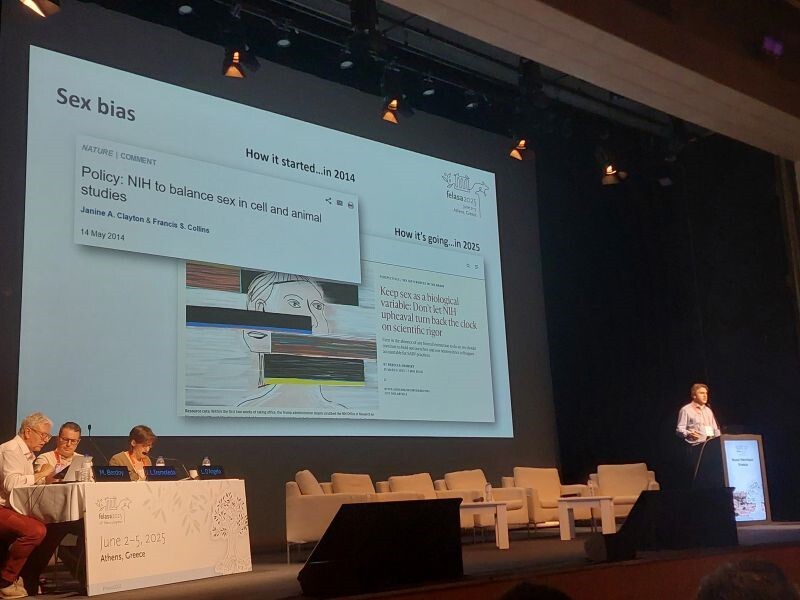
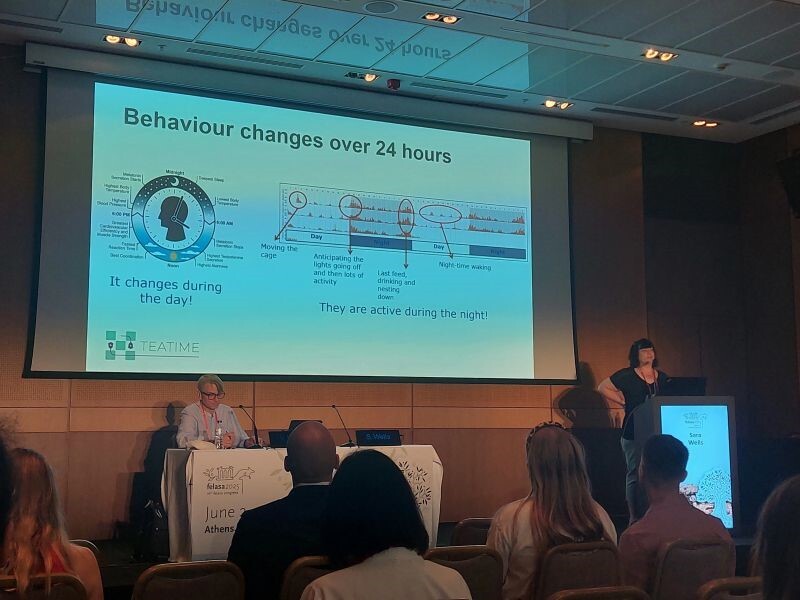
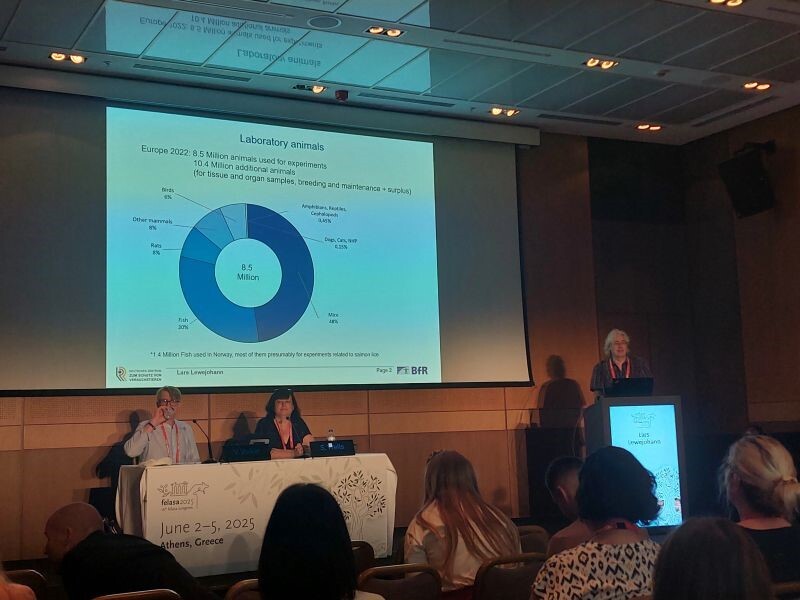
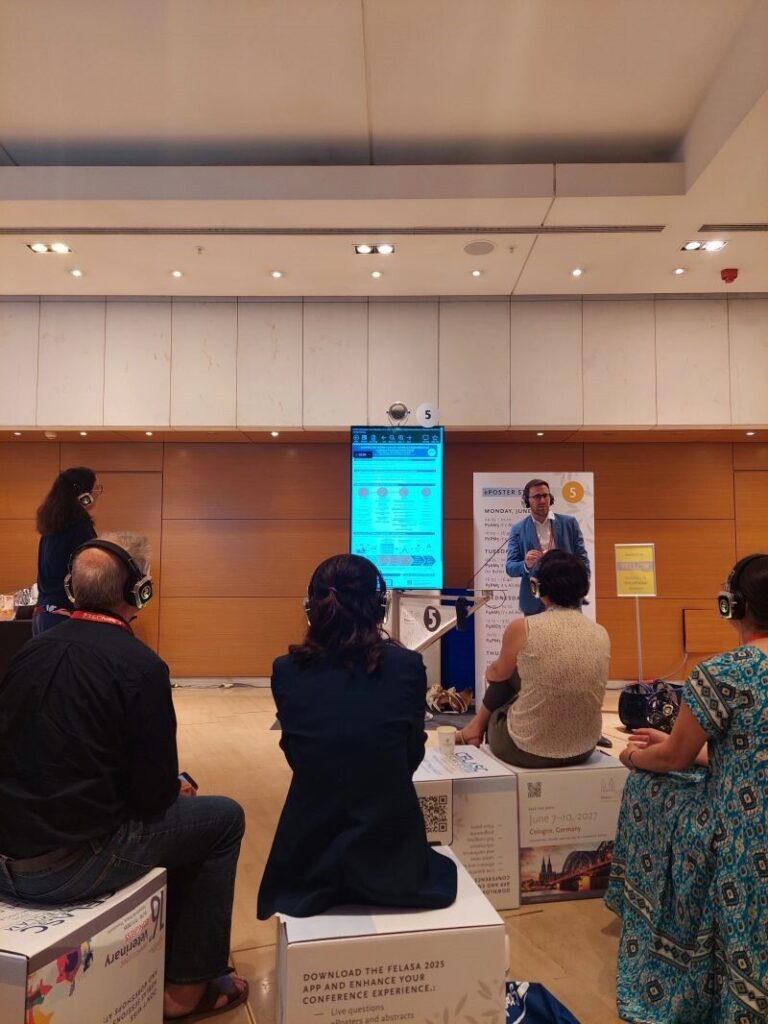
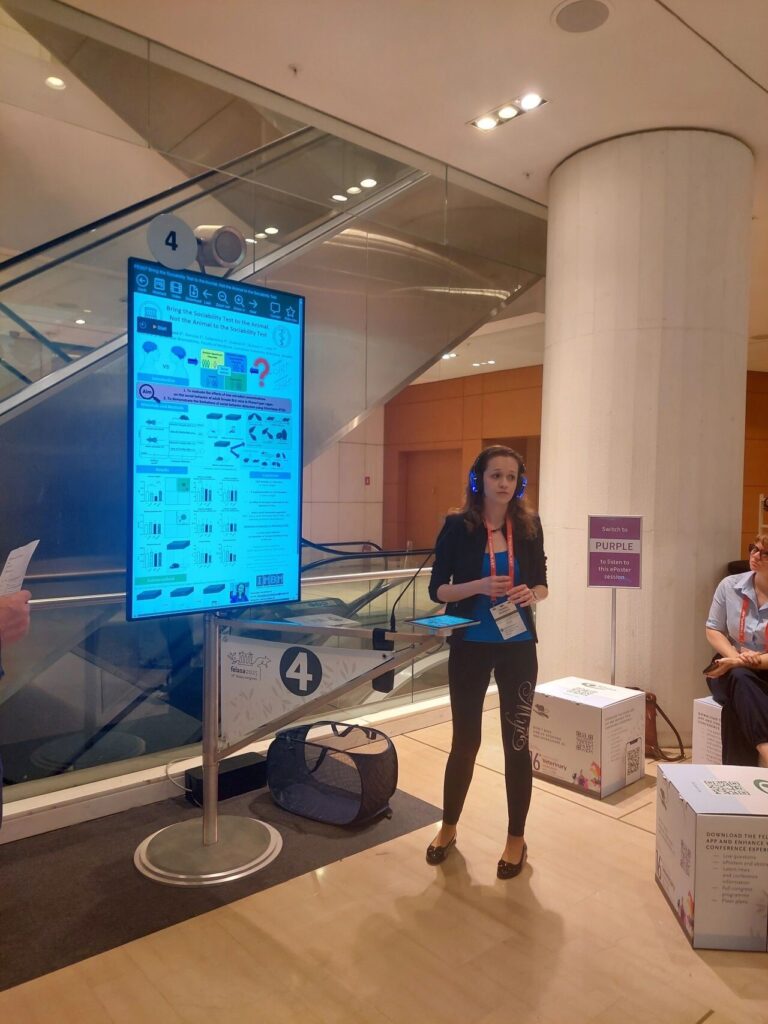
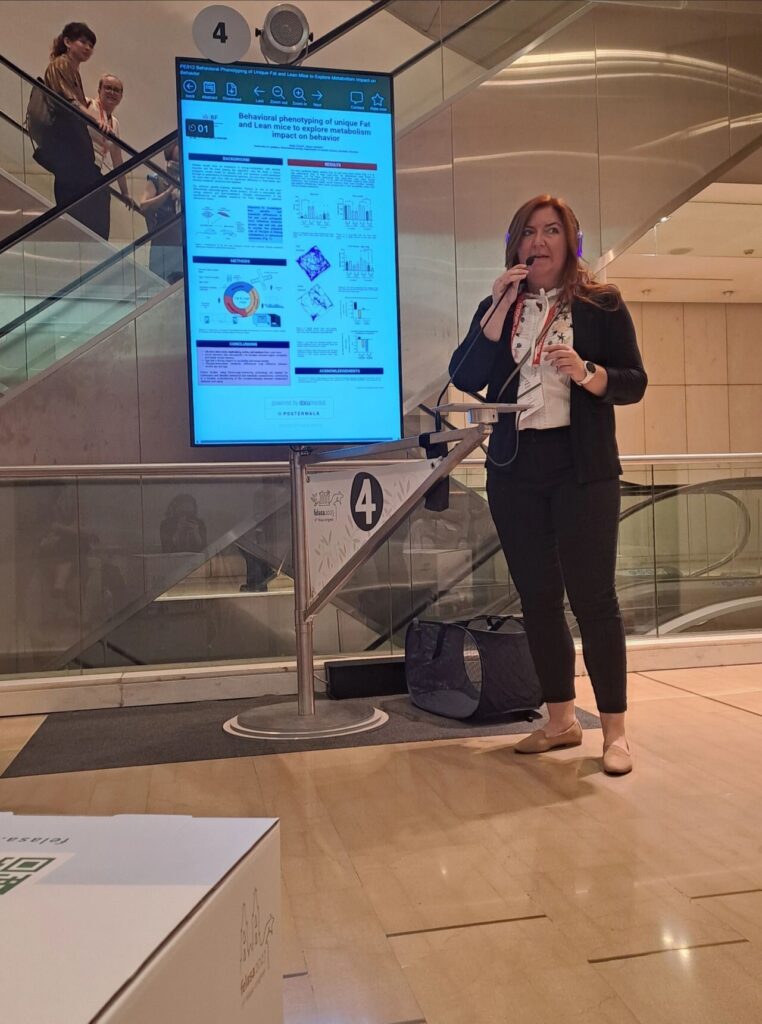
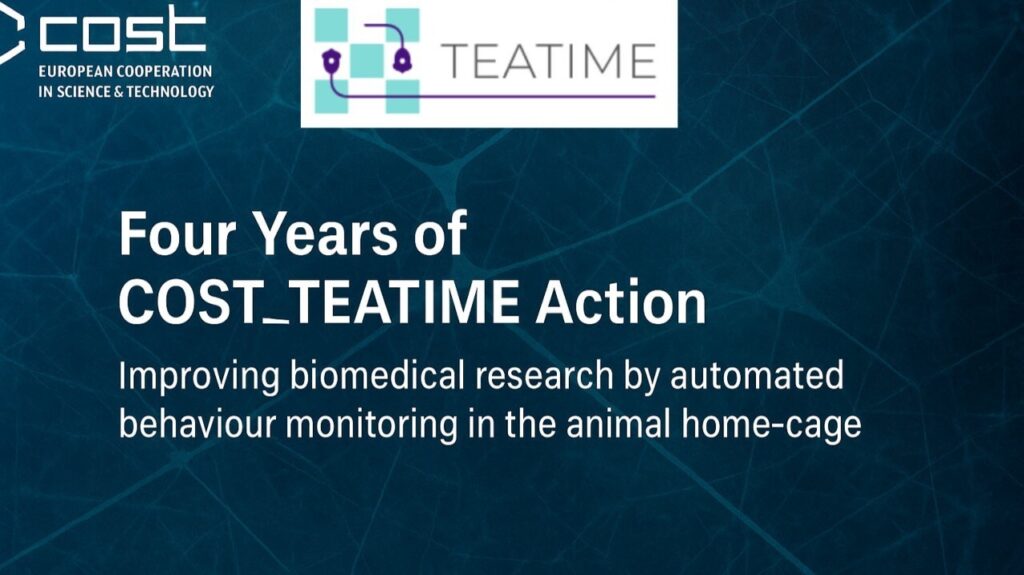
Executive Summary
After four years of groundbreaking research and collaboration, the COST Action “Improving biomedical research by automated behaviour monitoring in the animal home-cage” (TEATIME) is reaching its final milestone with a conference in Helsinki on September 2-3, 2025[1][2]. What began as a proposal written during the COVID-19 pandemic in March 2020 has evolved into one of Europe’s most significant collaborative networks in laboratory animal science, bringing together over 120 researchers from 34 countries[3].
Origins and Vision
TEATIME emerged from a critical recognition in the field of laboratory animal research. Traditional behavioral assessments, which involved removing animals from their home cages for testing in unfamiliar environments, were increasingly recognized as potentially stressful and inadequate for capturing the full spectrum of animal behavior[4][5]. The consortium was founded by 58 researchers in 23 countries with the ambitious goal of developing automated home-cage monitoring (HCM) technologies that would allow 24/7 observation of laboratory rodents in their familiar environments[6][4].
The project’s vision was multifaceted: to improve animal welfare through refined experimental conditions, enhance data reproducibility and reliability, and ultimately advance the 3Rs principles (Replacement, Reduction, and Refinement) in animal research[4][7]. By monitoring animals continuously within their home cages, researchers could capture more accurate representations of natural behavior and physiological responses[8].
Organizational Structure and Working Groups
TEATIME was structured around five specialized working groups, each addressing critical aspects of home cage monitoring:
Working Group 1: Identifying, Gathering, and Co-ordinating Community Requirements for HCM
Led by Anna Kiryk with co-leads Marthe Schmit and Aleksandra Bartelik, this group focused on understanding the needs of the research community and conducting comprehensive surveys to assess current usage and future requirements of HCM technologies[9].
Working Group 2: Current Status of HCM
Under the leadership of Ewelina Knapska and co-lead Silvia Mandillo, this group was responsible for cataloging existing home cage monitoring systems and conducting systematic reviews of the field[10]. Their work resulted in a comprehensive analysis of 521 publications spanning from 1974 to 2020, demonstrating remarkable growth in HCM-related research[11].
Working Group 3: Development of New Technologies, Analysis Tools, and Databases
Led by Jan Rozman with co-leads Sonia Bains, Hamish Forrest, and Marion Rivalan, this group focused on technological advancement and data analysis tool development, including the creation of harmonized terminology and standardized approaches to data processing.
Working Group 4: Training and Knowledge Transfer
Under Lior Bikovski’s leadership with co-leads Anna Olsson and Alice Melloni, this group organized training schools and educational initiatives to disseminate knowledge and build capacity within the research community[12].
Working Group 5: Communication, Engagement, and Dissemination
Led by Maša Čater with co-lead Lars Lewejohann, this group managed the Action’s communication strategy, social media presence, and scientific dissemination activities[13].
Major Scientific Achievements
Systematic Review and Meta-Analysis
One of TEATIME’s most significant contributions was the completion of a comprehensive systematic review examining the development and application of home cage monitoring in laboratory mice and rats[8][11]. This landmark study analyzed 521 publications and revealed that both absolute and relative numbers of HCM-related publications increased dramatically from 1974 to 2020 – with approximately 26-fold and 7-fold increases respectively[11].
The review identified several important trends:
- A clear shift from manual to automated monitoring techniques since the 2000s[11]
- Increasing use of both sexes and group housing in recent studies (2011-2020)[11]
- Growing application of artificial intelligence and machine learning for more refined behavioral parameter analysis[11]
- Extended monitoring periods, with 24-hour measurements becoming more frequent since the 2000s[11]
Technology Cataloging and Assessment
Working Group 2 developed a comprehensive catalog of existing home cage monitoring systems, creating an interactive database that detailed the capabilities, limitations, and applications of various technologies[13]. This resource became invaluable for researchers seeking to select appropriate monitoring systems for their specific research needs[10].
Survey and Community Assessment
The consortium conducted an extensive survey campaign that attracted 279 responses from 37 countries, providing unprecedented insights into the current state and future needs of the HCM community[9]. This survey, launched at the FELASA 2022 conference, gathered data from academics, facility managers, industry professionals, and funding organizations[13].
Development of TheBehaviourForum.org
A significant innovation was the creation of TheBehaviourForum.org, an online platform for discussing experimental methods in animal behavior research[14][15][16]. This forum, developed specifically for the TEATIME community but with broader applications, provides a space for researchers to share knowledge, troubleshoot experiments, and discuss best practices[17]. The platform has become a valuable resource for the global research community, fostering collaboration across disciplines and geographic boundaries[17].
Training and Capacity Building
TEATIME organized multiple training schools that provided hands-on experience with various home cage monitoring systems. The Second TEATIME Advanced Training School, held at the German Federal Institute for Risk Assessment (BfR) in Berlin in June 2024, exemplified the consortium’s commitment to education[12]. These schools covered experimental design, psychiatric and cognitive assessment, application to welfare and the 3Rs, and included practical workshops on building prototype devices using 3D printing and microelectronics[12].
The training programs reached 24 students in the first year alone, providing opportunities to learn from TEATIME experts how to reliably assess rodent behavior and welfare[7]. These educational initiatives were crucial for building the next generation of researchers skilled in home cage monitoring technologies[7].
Short-Term Scientific Missions (STSMs)
The Action facilitated numerous Short-Term Scientific Missions, offering grants of up to €4,000 each for research visits ranging from 5 days to 3 months[18][19]. These missions enabled researchers to visit laboratories in other countries, learn new techniques, and access specialized facilities not available in their home institutions[19]. The STSMs were particularly valuable for young researchers under 40 years old, providing international mobility and learning opportunities[18].
Scientific Dissemination and Impact
TEATIME maintained a robust presence at major scientific conferences throughout its duration. The consortium presented at numerous high-profile events including:
- Measuring Behavior 2022[13]
- Mediterranean Neuroscience Society Conference 2022[13]
- FELASA 2022[7][13]
- FENS Forum 2022[13]
- Society for Neuroscience conferences[20]
The Action also organized its own specialized meetings, including “The Pathway to Automation – from Home Cages to Welfare” in Brussels in September 2024, which brought together 41 experts from 13 countries to discuss animal welfare applications of home cage monitoring[21].
Innovation in Animal Welfare Assessment
A particularly significant development was TEATIME’s exploration of how home cage monitoring could be used to measure and improve animal welfare[21]. The consortium identified various biomarkers that could be used to automatically assess animal welfare, including:
- Body weight monitoring[21]
- Temperature changes[21]
- Respiratory rate assessment[21]
- Urination patterns[21]
- Complex behavioral analyses using deep learning solutions[21]
The work also explored lessons learned from automated behavioral observation of larger animals such as pigs and cattle, applying these insights to rodent monitoring[21].
Data Management and FAIR Principles
TEATIME addressed the critical issue of data management in home cage monitoring, emphasizing the importance of implementing FAIR principles (Findability, Accessibility, Interoperability, and Reusability)[21]. The consortium worked on developing standards for data collection, naming, sorting, storage, and metadata provision[21].
Publications and Research Outputs
Beyond the major systematic review, TEATIME members produced numerous scientific publications and research outputs. The consortium’s work contributed to advancing the field’s understanding of:
- Optimal experimental designs for home cage monitoring[5]
- Statistical methods for analyzing longitudinal behavioral data[5]
- Integration of multiple monitoring modalities[5]
- Standardization of behavioral terminology and ontologies[22]
Network Growth and International Collaboration
The consortium experienced remarkable growth from its initial 58 founding researchers to over 120 researchers from 34 countries by 2022[7][3]. This expansion demonstrated the international recognition of TEATIME’s importance and the growing interest in home cage monitoring technologies worldwide.
Final Conference: “The TEATIME Journey – Shaping the Future of Lab Animal Monitoring”
The Action’s culminating event is scheduled for September 2-3, 2025, in Helsinki, Finland[1][2]. This final conference will bring together experts in biomedical research, animal behavior, laboratory animal science, and data science to:
- Reflect on the consortium’s achievements over four years[1]
- Share insights and latest developments[1]
- Explore future directions in non-invasive, 24/7 behavioral monitoring in rodents[1]
- Discuss refinement of experimental conditions and improvement of animal welfare[1]
- Address enhancement of translatability and data reproducibility[1]
Legacy and Future Impact
TEATIME’s four-year journey has fundamentally transformed the landscape of home cage monitoring in laboratory animal research. The consortium has:
- Established Scientific Foundation: Created the most comprehensive systematic review of HCM literature, providing a solid evidence base for future research[8][11].
- Built Global Network: Connected researchers across Europe and beyond, fostering collaboration and knowledge exchange[3].
- Developed Resources: Created practical tools including technology catalogs, training materials, and the TheBehaviourForum.org platform[10][15].
- Advanced Technology: Promoted the development and validation of new monitoring systems and analytical approaches[22].
- Educated Next Generation: Trained numerous young researchers through schools, STSMs, and collaborative projects[12].
- Improved Animal Welfare: Advanced the application of the 3Rs principles through refined monitoring approaches[4][7].
- Enhanced Data Quality: Promoted standardization and reproducibility in behavioral research[5].
Conclusion
As TEATIME approaches its conclusion in September 2025, the Action stands as a remarkable example of successful European scientific collaboration. From its origins during the COVID-19 pandemic to its evolution into a major international network, TEATIME has significantly advanced the field of home cage monitoring and established a foundation for future innovations in laboratory animal science.
The consortium’s comprehensive approach – combining systematic research, technology development, education, and international collaboration – has created lasting impact that extends far beyond the four-year funding period. The resources, networks, and knowledge generated by TEATIME will continue to benefit the research community for years to come, ultimately contributing to better science and improved animal welfare in biomedical research.
The final conference in Helsinki will mark not an end, but a transition – from a funded consortium to a self-sustaining community of researchers committed to advancing the field of automated home cage monitoring. The tools, relationships, and knowledge created through TEATIME provide a solid foundation for continued progress toward the goal of more humane, accurate, and reproducible animal research.
⁂
- https://www.cost-teatime.org/events/the-teatime-journery-shaping-the-future-of-lab-animal-monitoring/
- https://www.lifescience.net/events/75895/cost-action-conference-the-teatime-journey-shaping/
- https://www.cost-teatime.org/news/cost-action-20135-teatime-in-its-first-year/
- https://www.cost-teatime.org/about/
- https://researchportal.helsinki.fi/en/publications/focus-on-novel-approaches-home-cage-monitoring-of-laboratory-mice
- https://www.cost-teatime.org
- https://www.eara.eu/post/lab-animal-monitoring-for-better-science
- https://www.cost-teatime.org/news/a-systematic-review-of-the-development-and-application-of-home-cage-monitoring-in-laboratory-mice-and-rats/
- https://www.cost-teatime.org/wp-content/uploads/2024/06/TEATIME-Home-Cage-Monitoring-Survey-Report-12-June-2024.pdf
- https://www.cost-teatime.org/working-groups/wg2/
- https://pubmed.ncbi.nlm.nih.gov/37953247/
- https://www.cost-teatime.org/training/3rd-teatime-training-school/
- https://www.cost-teatime.org/wp-content/uploads/2023/01/TEATIME-annual-report-October-2022.pdf
- https://www.thebehaviourforum.org/tos
- https://www.cost-teatime.org/about/thebehaviourforum/
- https://www.cost-teatime.org/events/thebehaviourforum-org-the-society-for-neuroscience-washington-november-2023/
- https://attp.global/application-process/achievement-overview/
- https://www.cost-teatime.org/grants/open-call-for-short-term-scientific-missions-stsms-2/
- https://www.cost.eu/uploads/2022/08/TEATIME-STSM-Grant-application-guidelines-evaluation-criteria-May-2022.pdf
- https://open-neuroscience.com/en/post/a_place_to_discuss_experimental_methods_in_animal_behaviour/
- https://www.cost-teatime.org/news/teatime-meeting-the-pathway-to-automation-from-home-cages-to-welfare-brussels-2-3-sept-2024/
- https://nc3rs.org.uk/news/evolution-behavioural-monitoring-technologies-role-multidisciplinary-collaborations
The second part of our COST TEATIME webinar, “The Art of Communicating Animal Research in the 21st Century,” brought together a dynamic group of experts in science communication, ethics, AI, and public engagement to explore how digital tools can reshape the way we talk about animal research. This session, held on May 7 2025, focused on practical ways to use artificial intelligence and social media to foster transparency, reach wider audiences, and handle the ethical complexities of communicating research involving animals. The goal was clear: to rethink how we, as a scientific community, share and shape the narrative in the digital age.
Webinar was organized by Maša Čater (University of Ljubljana, European Animal Research Association Ambassador), who opened the session by emphasizing the power of social media in building transparency and global visibility. She encouraged researchers to take initiative in leading the conversation about their work—before controversy strikes. Her message was clear: communication should be proactive, not reactive.
Stefano Gaburro (CCC) followed with practical strategies on using LinkedIn and AI tools to communicate more transparently and effectively. He stressed that scientists don’t need to become influencers, but they do need to learn how to present their work clearly and authentically in the online space.
Damien Huzard (University of Montpellier, NeuroNautix) introduced an innovative tool called LiPT (LinkedIn PostTechnician), designed to help scientists write more strategic, engaging, and understandable posts on LinkedIn. His contribution highlighted how even simple language tweaks can drastically improve a post’s impact.
Debora Bogani (Mary Lyon Centre, MRC Harwell) brought a critical ethical lens to the conversation, raising important questions about the responsible use of AI in scientific communication. She reminded us that while AI can be helpful, it must be used with caution, especially in fields where public sensitivity is high—like animal research.
Nuno Miguel Gonçalves (EARA) demonstrated how AI tools like ChatGPT can be harnessed to improve the clarity of Non-Technical Summaries (NTS), making complex research more accessible and supporting the promotion of the 3Rs (Replacement, Reduction, and Refinement) in animal research.
Inês Serrenho (EARA) drew from successful outreach campaigns such as #BOARD to show how scientists can effectively counter misinformation and build trust with the public through thoughtful use of social media. Her examples highlighted the importance of combining transparency with creativity.
Finally, Monique Havermans (EARA) addressed one of the toughest parts of science communication—dealing with negativity. She offered thoughtful strategies for handling critical or hostile responses online, stressing the long-term value of consistency, honesty, and empathy in rebuilding public trust.
The session welcomed 280 participants from 30 countries across the globe, demonstrating the growing international interest in improving how we communicate about animal research. The diverse audience contributed to vibrant discussions and reflected the universal relevance of the topic. This webinar underscored that AI and social media are not merely tools for outreach—they are vital components of a broader cultural shift toward open, ethical, and inclusive science communication. As researchers, communicators, and institutions, we must continue to evolve our strategies and embrace these platforms to engage meaningfully with society.
If you missed the webinar, the full recordings are available online on TEATIME YouTube channel:
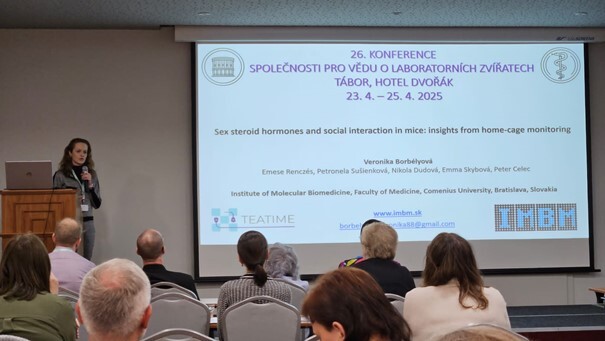
The 26th annual CLASA conference, held in April 2025, brought together professionals to discuss current issues related to the breeding and use of laboratory animals in scientific research. Key topics included the application of the 3Rs principles (Replacement, Reduction, and Refinement), advancements in animal health monitoring, and the development and potential of alternative in vitro methods.
Members of the TEATIME also participated in the conference.
Veronika Borbélyová presented findings from her research on the role of sex hormones in modulating social behavior in mice, using data obtained from advanced home cage monitoring systems.
Aleksandra Bartelik and Anna Kiryk contributed with a poster titled “HomeCage Monitoring – Improving Reproducibility and Animal Welfare in Scientific Research.”
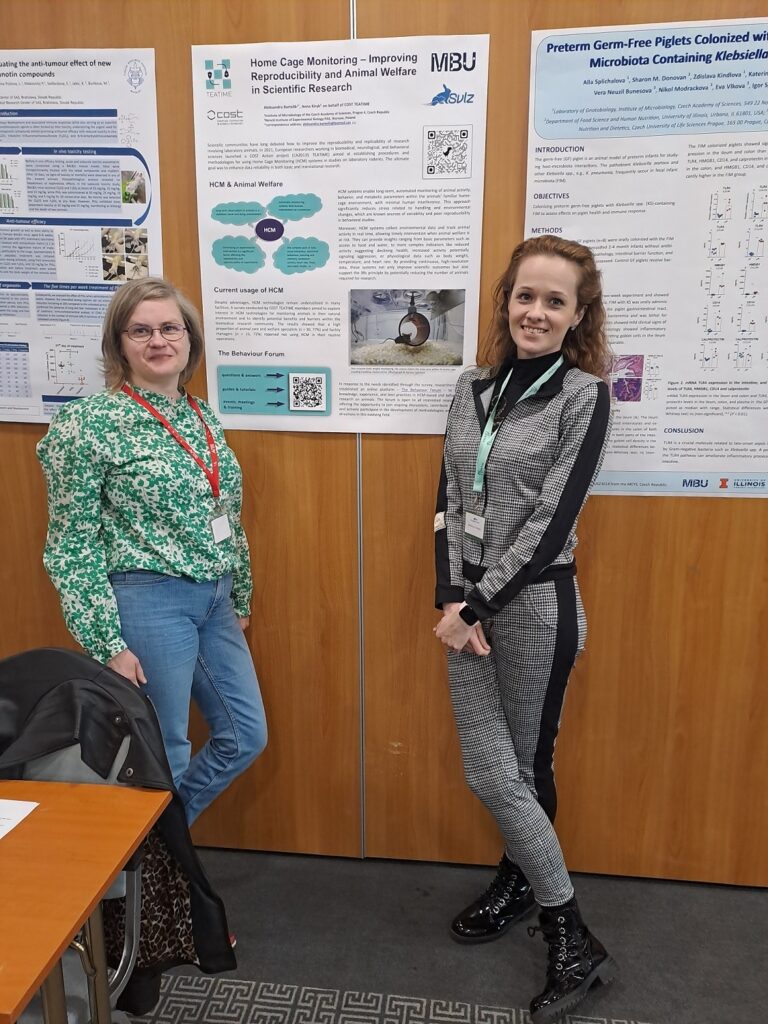
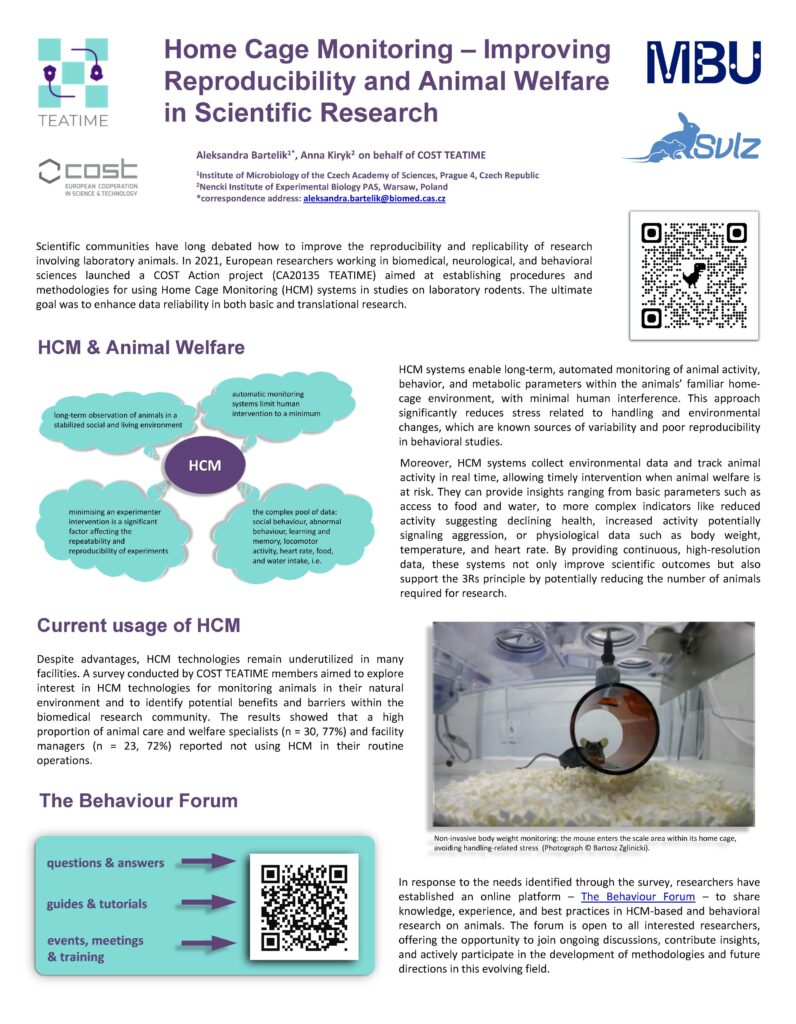
On March 3rd and 4th, 2025, TEATIME members gathered for an inspiring and collaborative two-day meeting filled with thought-provoking sessions and hands-on working sessions. From pioneering discussions on home-cage monitoring (HCM) systems to future strategies for animal research, the meeting marked a significant step forward for our community.
The event kicked off with warm greetings from Angelo Basteris, our COST Scientific Officer. The first sessions focused on developing an HCM ethogram and ontology. We also discussed expanding TheBehaviourForum.org, sharing ideas how the platform could sustain beyond TEATIME to promote webinars and collaboration. We also had a session on software tools for analyzing HCM data. Delegates shared their experiences, creating a valuable catalog of tools for the community. The afternoon’s discussions on strategic foresight and automation in animal research set the tone for how TEATIME can continue shaping the future of animal research while advancing animal welfare. We wrapped up the first day with a creative session on producing a TEATIME promotional video, where everyone pitched ideas and helped bring our community’s work to life.
Day two started with a session on sex differences in research, followed by an insightful discussion on the Animal Behaviour Open Research initiative. We also brainstormed ideas for TEATIME’s future webinars, training schools, and sustainability efforts. During the session on stakeholder communication, participants were identifying key stakeholders and the best ways to engage them moving forward. This led to deep discussions in breakout groups, creating a roadmap for how to strengthen our outreach.
As the meeting wrapped up, the energy was high. We reflected on the progress we had made and looked forward to the challenges and opportunities ahead. Breakout groups dig well into critical topics like data analysis innovations and the future of TEATIME training, ensuring we continue evolving and meeting the needs of animal research. The two days were a testament to the power of collaboration. Our team is more united than ever, and we can’t wait to continue pushing the boundaries of animal research and welfare together.
Why is communicating animal research important, and how can we address its challenges? These were key topics at the TEATIME webinar on animal research communication, held on January 28, 2025. The event was organized by Maša Čater, PhD, leader of the TEATIME Communication and Dissemination working group, as part of a 2024 virtual mobility grant. The webinar garnered overwhelming interest, attracting 354 attendees from around the world. The largest group of participants came from Germany, followed by France, Slovenia, Portugal, Italy, the United Kingdom, Mexico, Canada, and others (Figure 1). The webinar featured a diverse and multinational lineup of speakers, covering a wide range of perspectives on animal research communication.
Nuno H. Franco from i3S (Portugal) provided a historical overview of the social acceptability of animal research. Kirk Leech, Director of EARA (UK), highlighted the importance of transparent communication in this field. Susanne Diederich from the German Primate Center (Germany) presented successful case studies demonstrating effective communication strategies. The challenges of communicating animal research were addressed by three experts. Monique Havermans from EARA (Netherlands) explained how transparency agreements operate across different countries. Susanne Diederich expanded on strategies to motivate employees to engage in communication efforts and illustrated how transparency levels vary between institutions. Roman Stilling from Tierversuche verstehen (Germany) focused on the goals of communication initiatives, emphasizing transparency, openness, and the expected short- and long-term impact of such efforts. Maša Čater from the University of Ljubljana (Slovenia) provided insights into effective communication strategies across different channels, presenting the general principles of successful communication. Bob Tolliday from EARA (UK) followed with a discussion on how well-crafted website content can enhance public engagement and improve communication about animal research. The final section focused on crafting a compelling narrative from our research stories, featuring two insightful speakers. Damien Huzard from Neuronautix (France) captivated us with the power of storytelling in science, while Nuno Goncalves from EARA (Portugal) shared valuable strategies for enhancing our non-technical summary writing.
In conclusion, the animal research communication webinar provided invaluable insights into effectively sharing the story of our research with diverse audiences. From harnessing the art of storytelling to refining our non-technical summaries, the sessions offered practical tools and strategies that can significantly enhance how we engage with the public, policymakers, and the broader scientific community. By mastering these communication skills, we can help foster a greater understanding of the vital role animal research plays in advancing science and improving lives. As we continue to push the boundaries of discovery, these lessons will guide us in ensuring that our research reaches its full potential in both impact and accessibility.
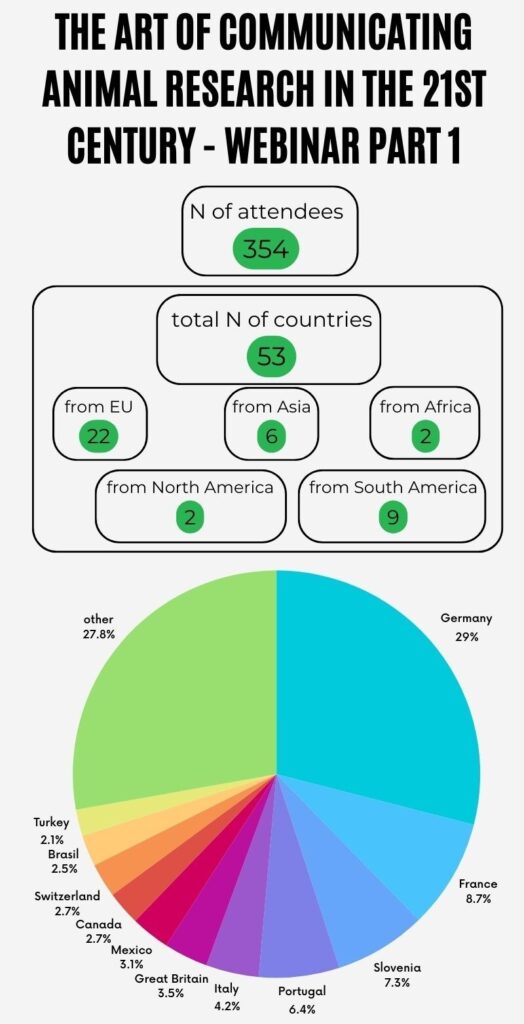
|
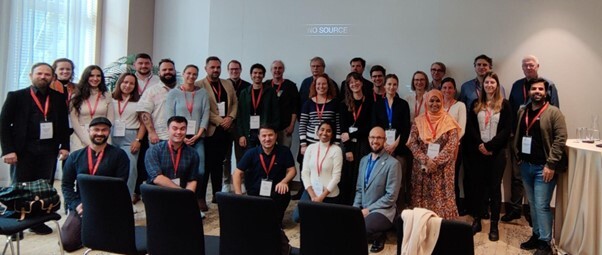
The recent Young Researcher Workshop was organised by the COST Action 20135 TEATIME and hosted by Institute of Biomedicine and Translational Medicine, University of Tartu, Estonia (https://biomeditsiin.ut.ee/en). It was significant in fostering collaboration and knowledge exchange among emerging scientists. With 31 participants from 14 countries, the diverse lineup of experts was invited, including both TEATIME members and external specialists. This workshop provided a unique platform for young researchers to share their experiences and insights in a supportive, home-like environment.
The workshop agenda featured a wide range of scientific topics, with plenary lectures that addressed various aspects of human diseases and the translational use of laboratory rodents. Key discussions revolved around themes such as ageing and disease biomarkers, where researchers examined how animal behaviour can serve as indicators in the study of ageing. Participants explored the effects of atypical antidepressants on behaviour related to chronic early life stress, emphasizing the need to understand psychological resilience. They also discussed the side effects of the new anti-obesity drug, along with preliminary insights into rodent models for Wolfram syndrome, setting the stage for future research opportunities
The first day of the workshop was exceptionally productive, by engaging discussions that continued even during coffee breaks and lunch. This vibrant exchange of ideas not only enriched the participants’ experiences but also fostered networking opportunities that could lead to future collaborations. As the day concluded, attendees gathered for a delightful dinner in a cosy restaurant. The enthusiasm of the organisers contributed to a warm and inviting atmosphere, allowing participants to reflect on the day’s discussions and forge deeper connections.
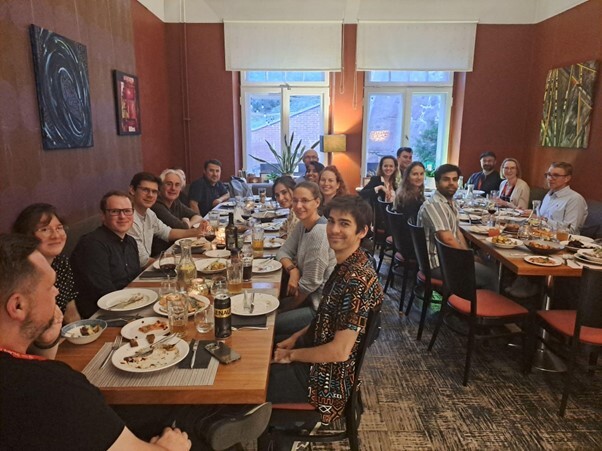
On Day 2, the workshop shifted focus to interactive sessions centred around use of various home-cage monitoring systems. Participants shared their experience and explored obstacles and solutions in using technology for automated behavioural assessment. These discussions were enriched by excellent talks from experts emphasizing the importance of animal welfare, a critical aspect of contemporary research. One of the highlights of the day was the introduction of “TheBehaviourForum” to new participants, encouraging them to explore the platform to better understand animal behavior and underscoring the essential role of behavioral studies in advancing scientific knowledge. Another key discussion revolved around the opportunities and future possibilities for young researchers in TEATIME. This session sparked enthusiasm among participants, encouraging them to envision their roles and contributions to the organisation moving forward. The day concluded with a beautiful walking tour in Tartu Old Town and Toome Hill, where attendees could witness the rich history and culture of the European Capital of Culture for 2024.
